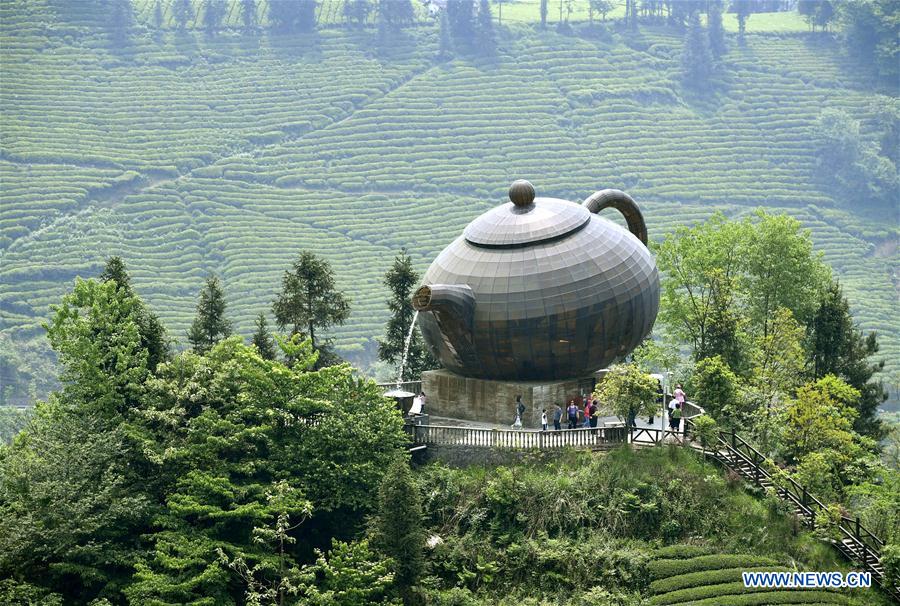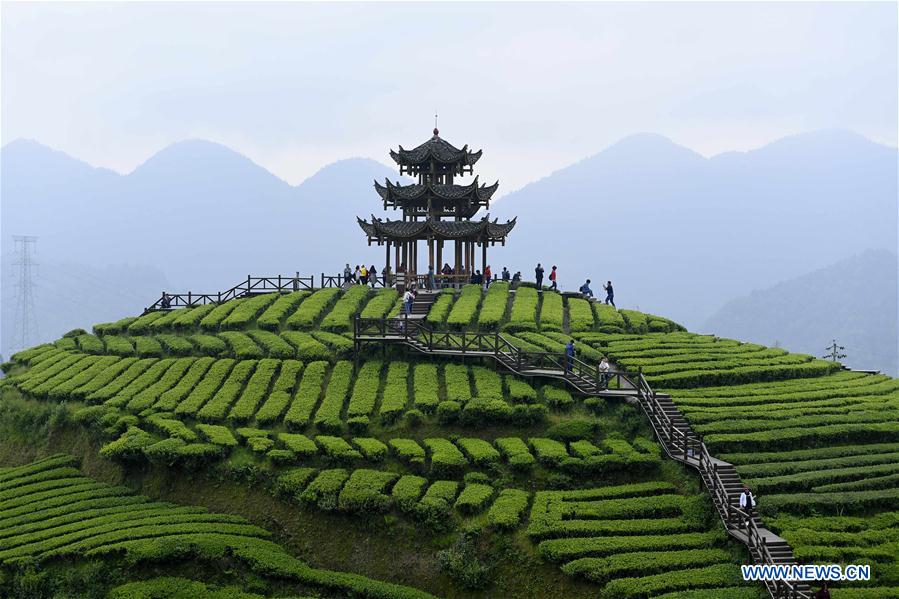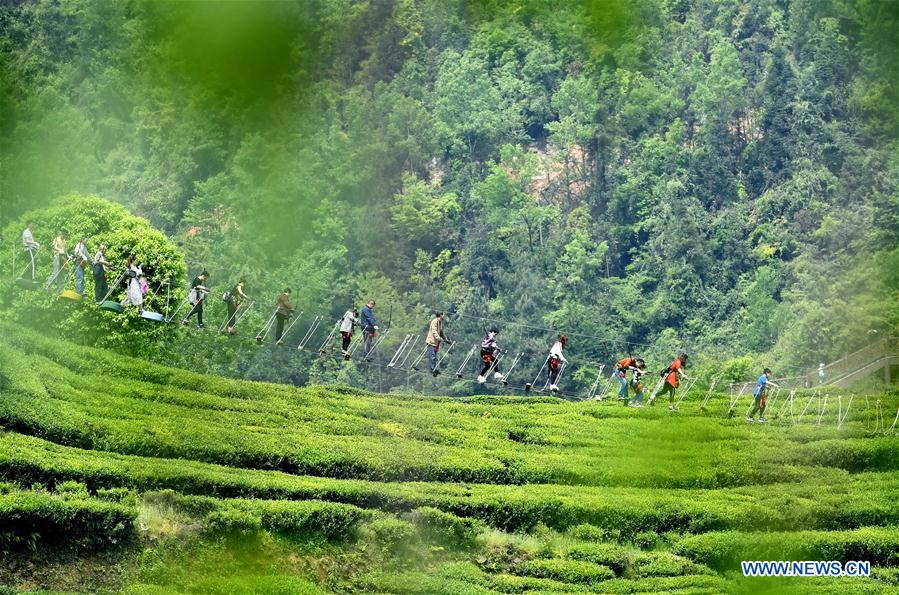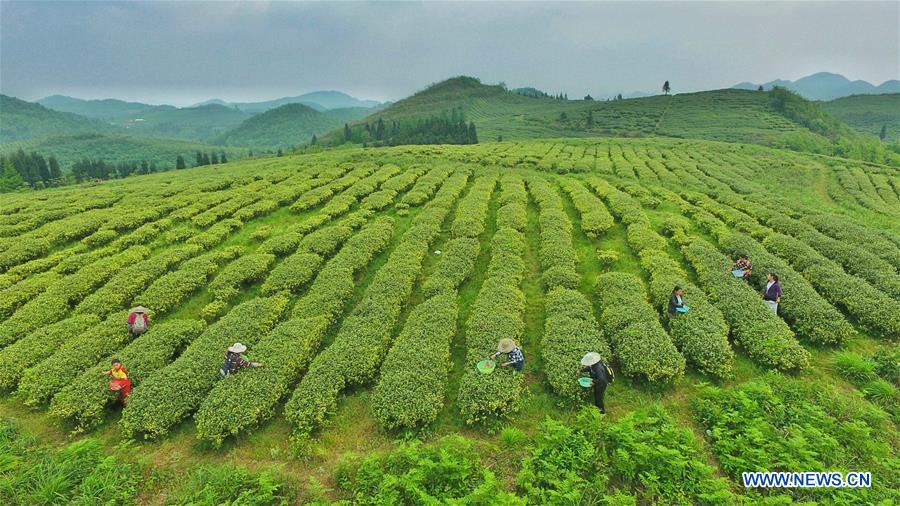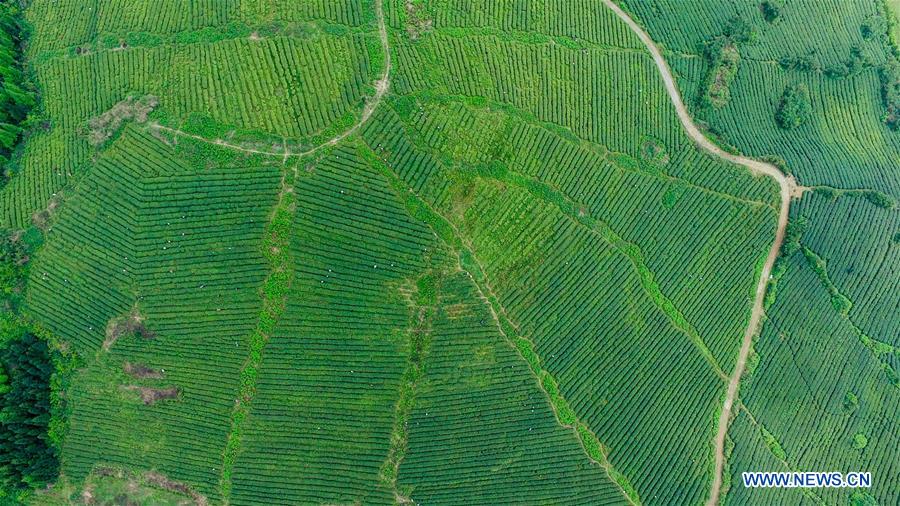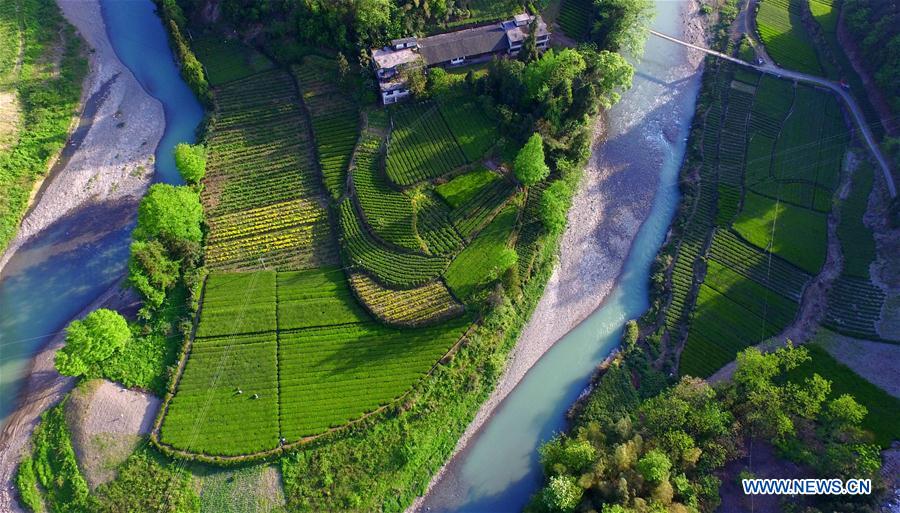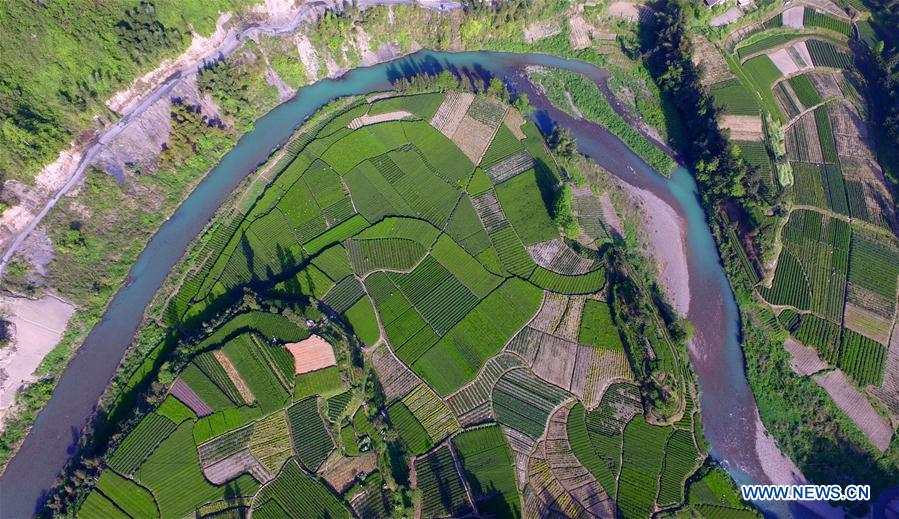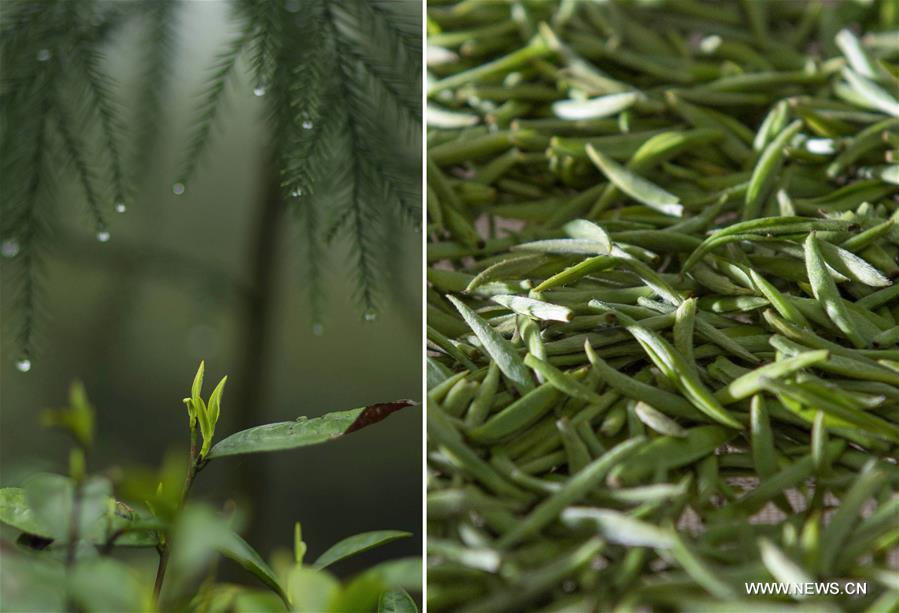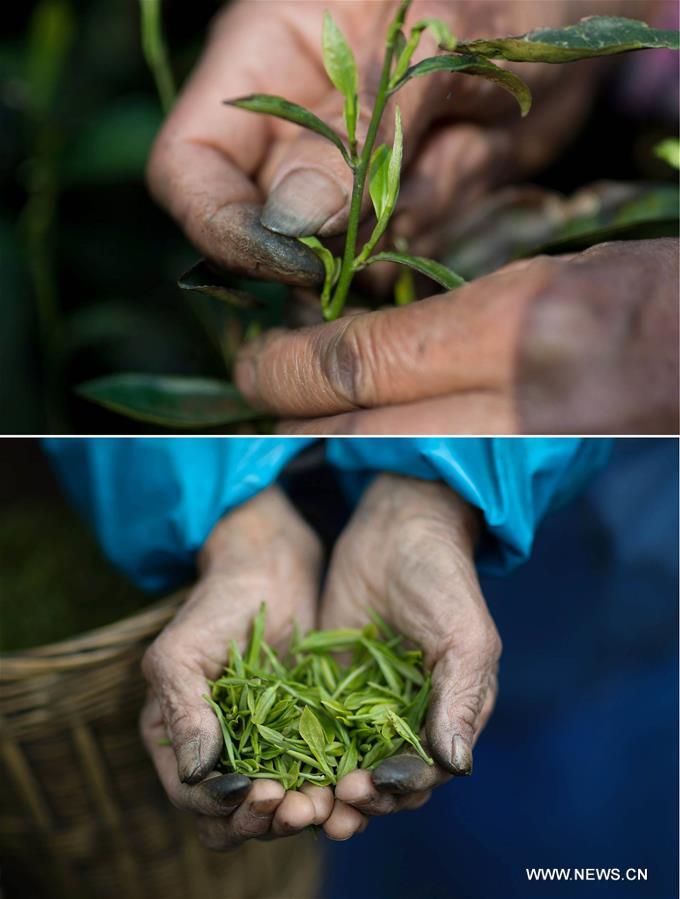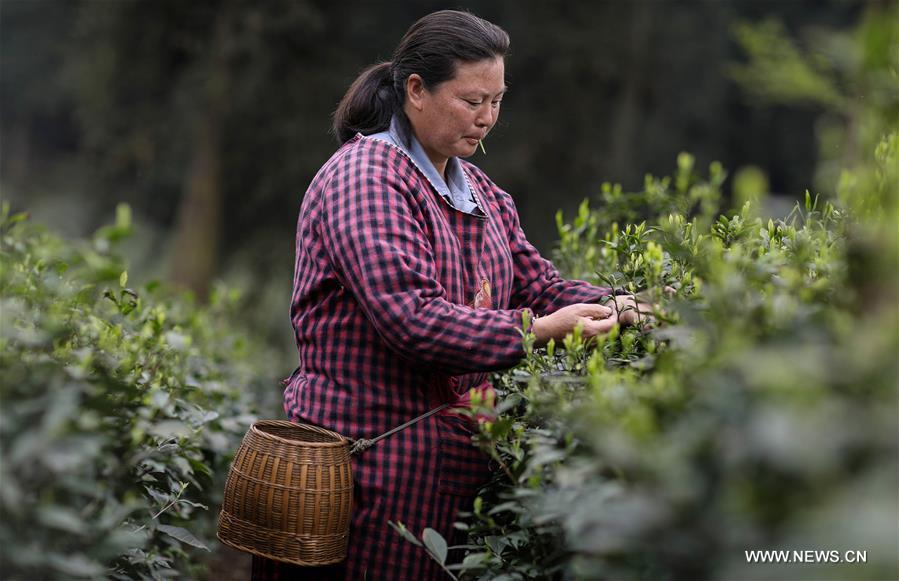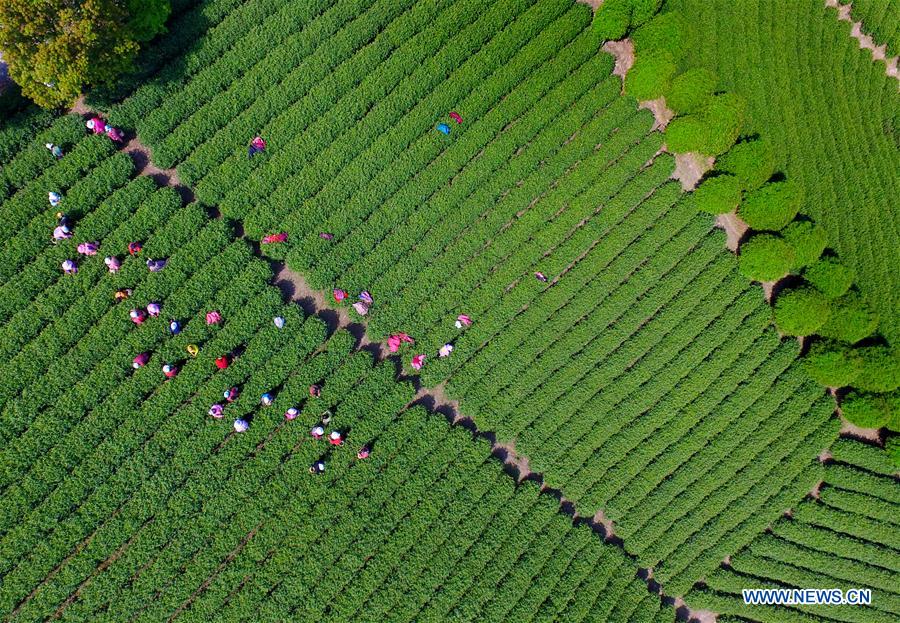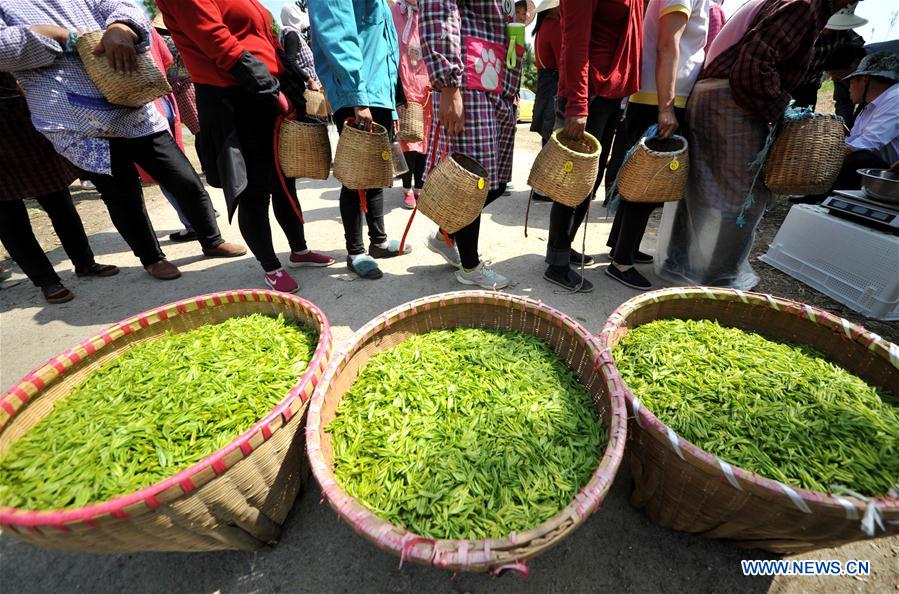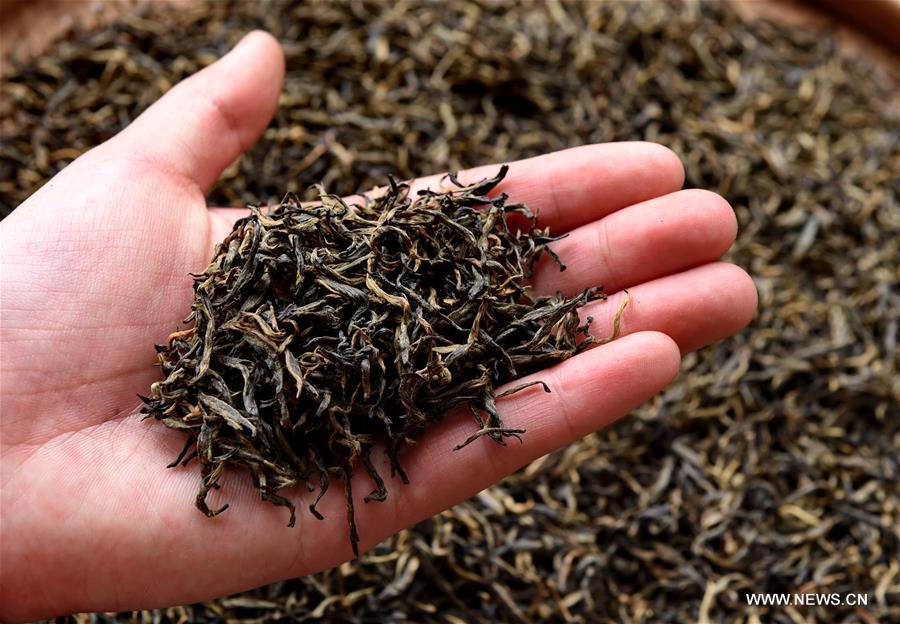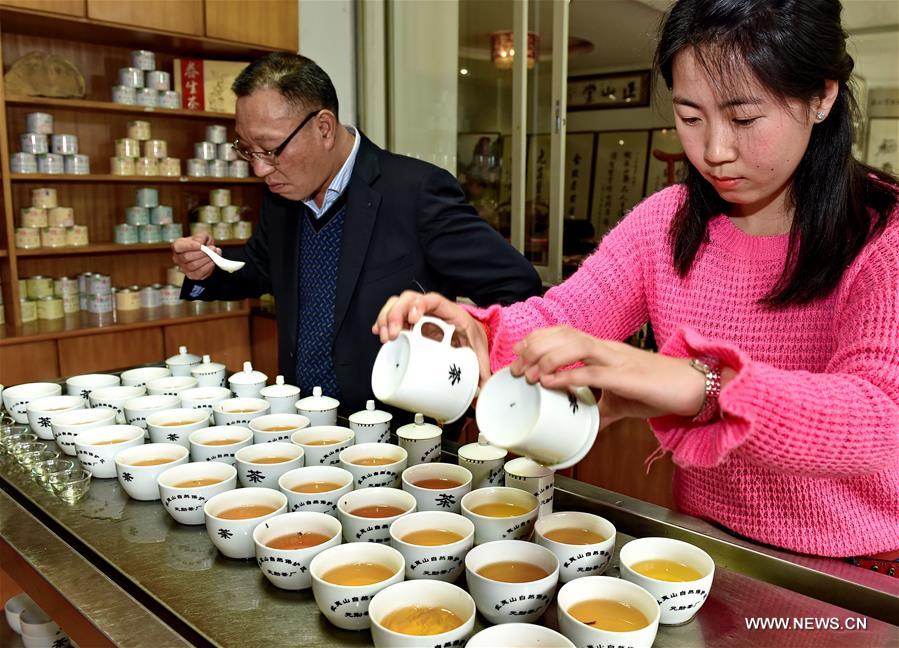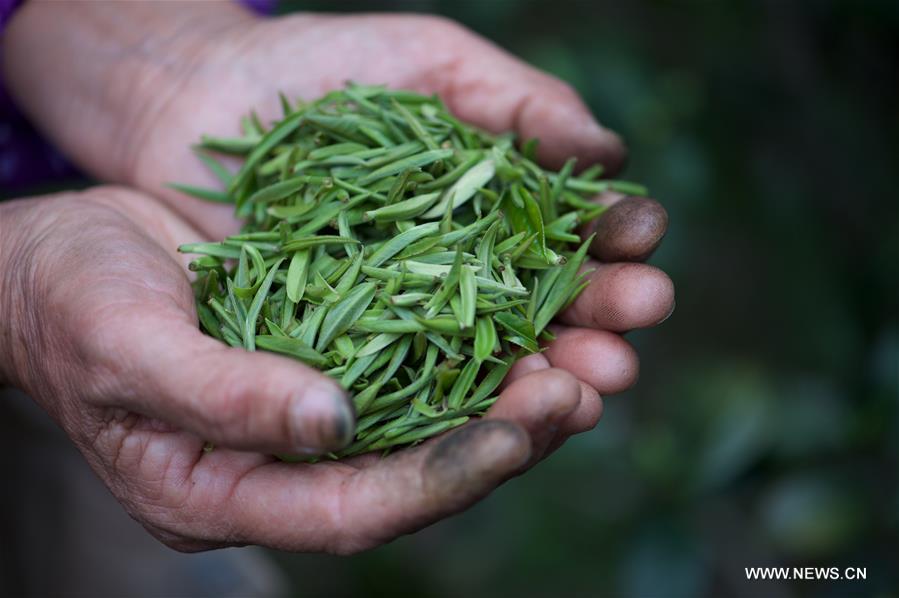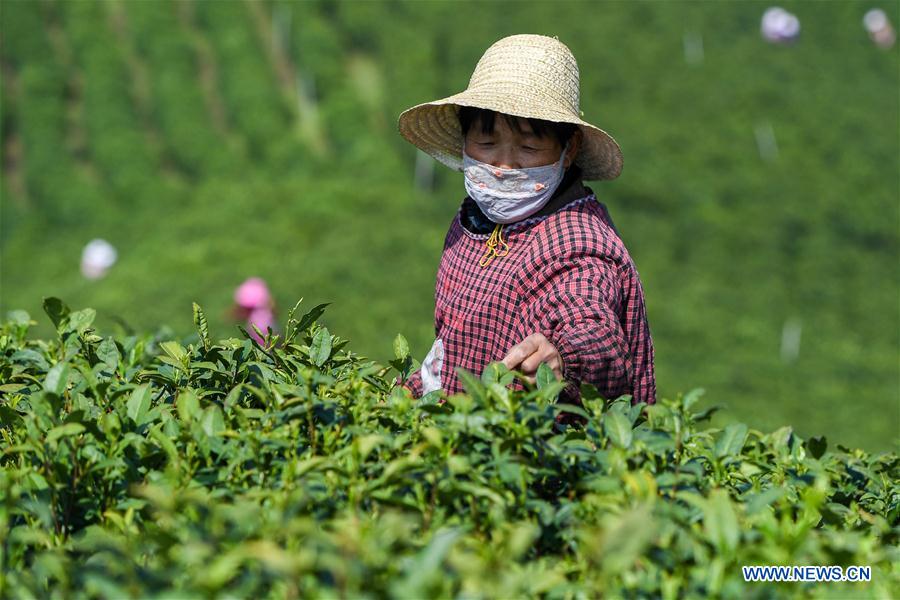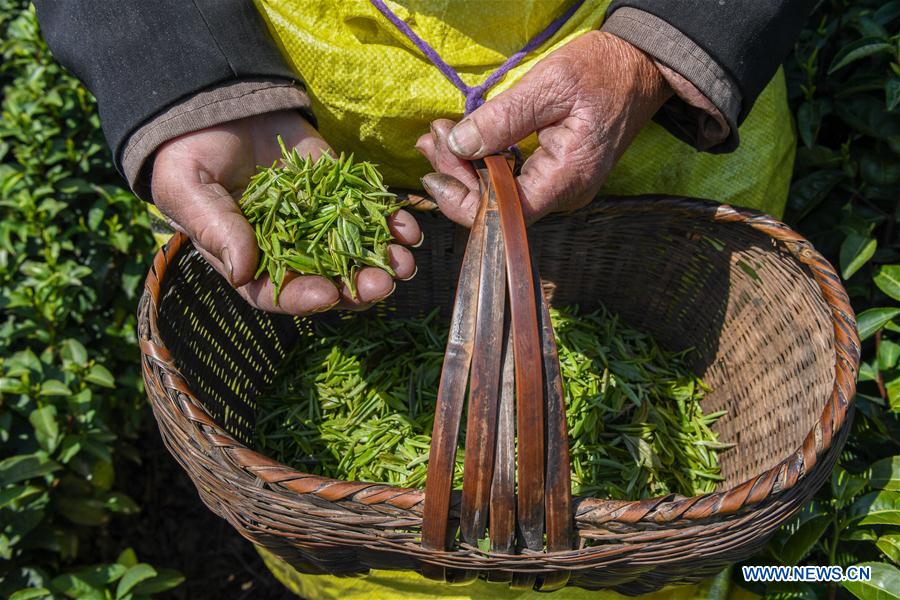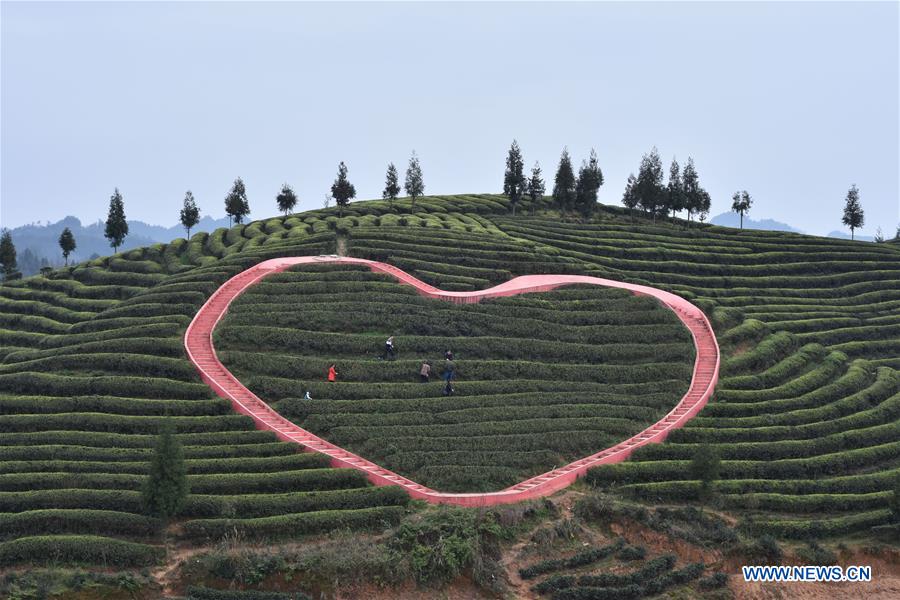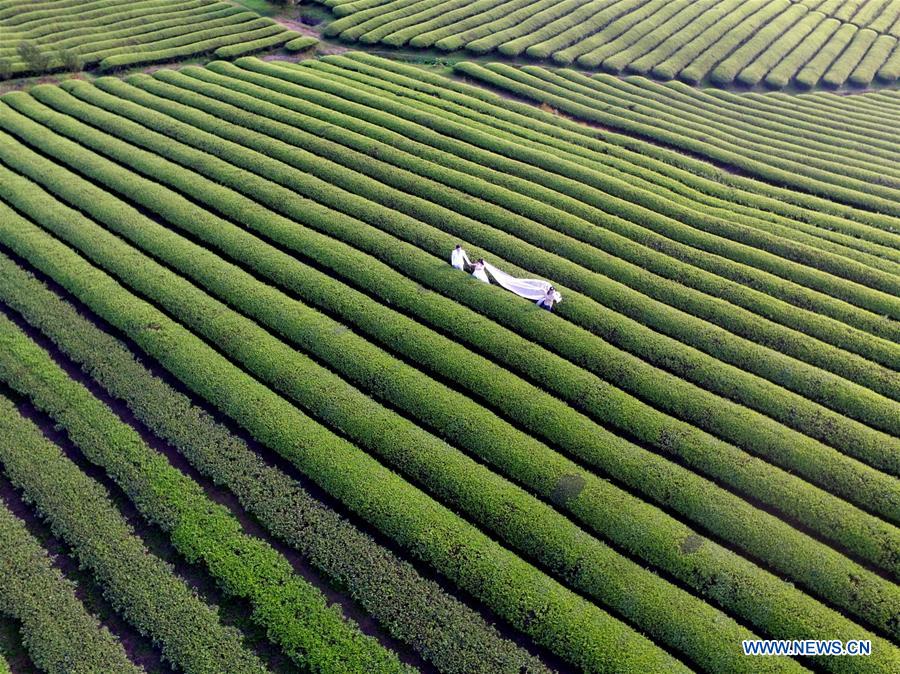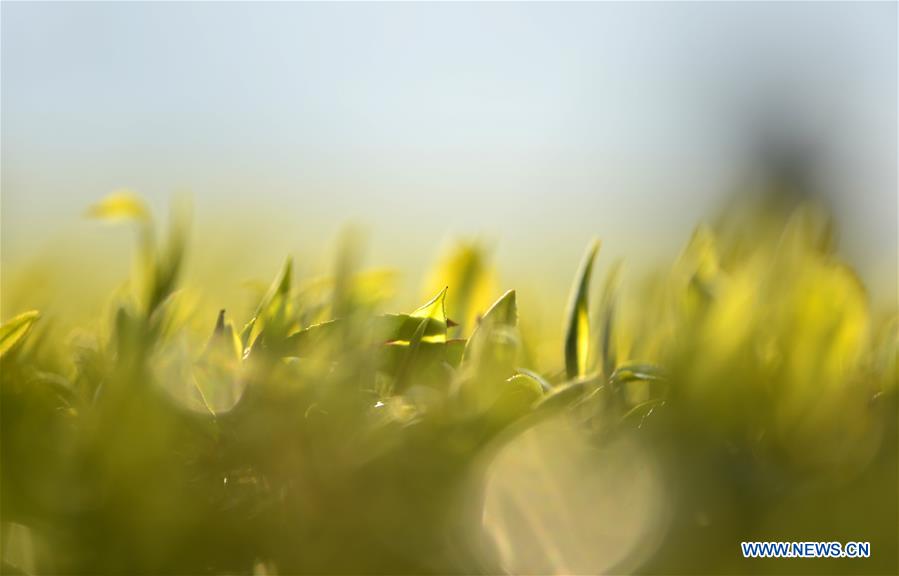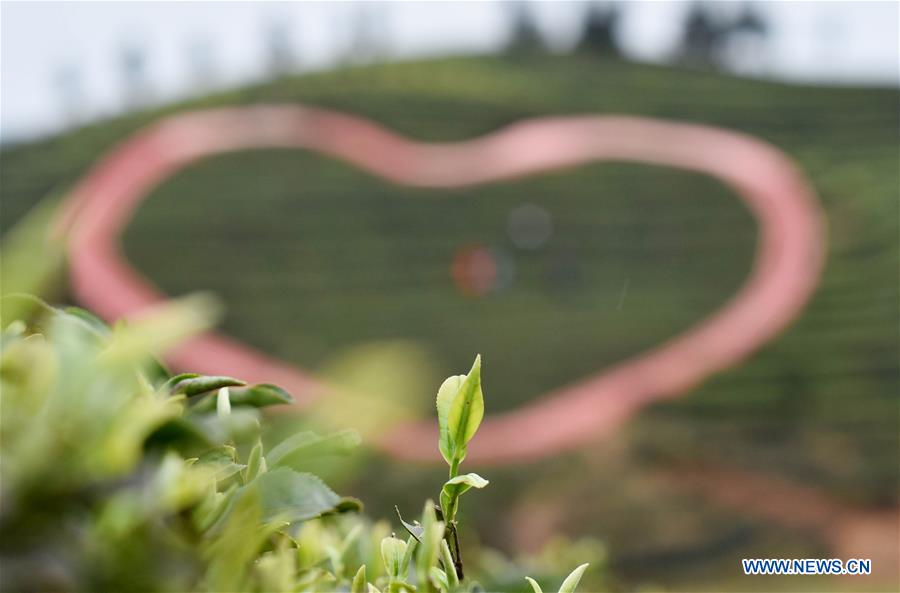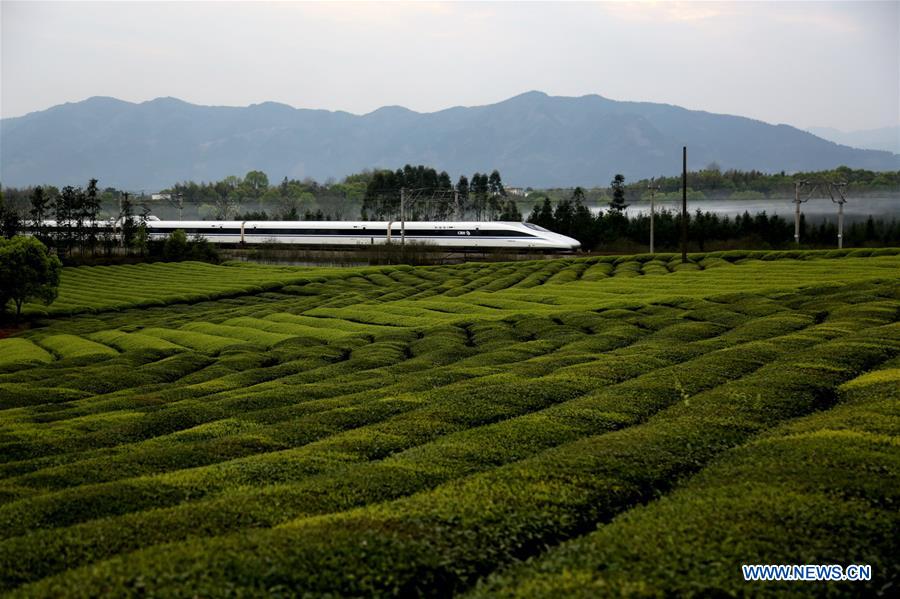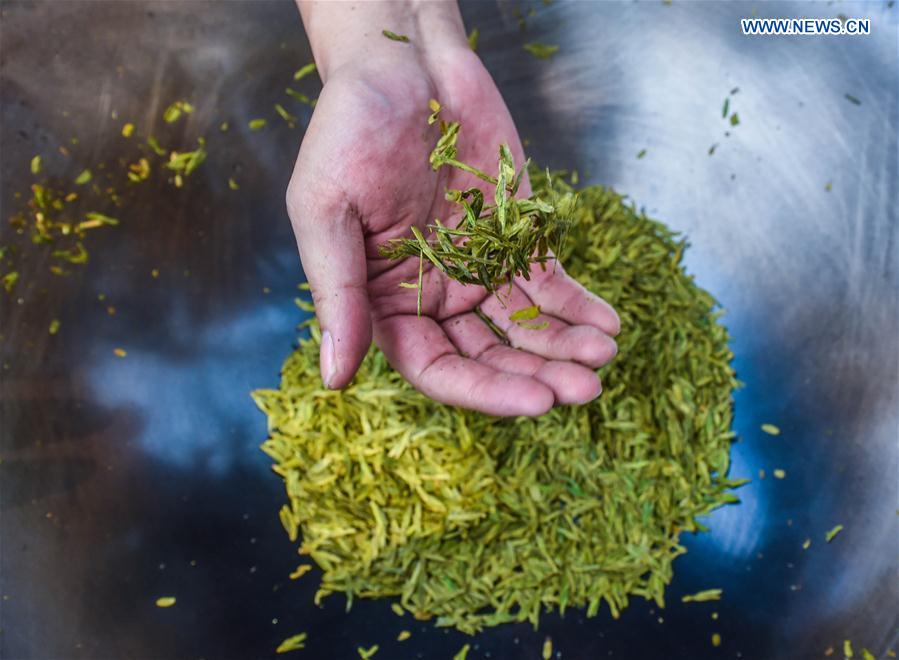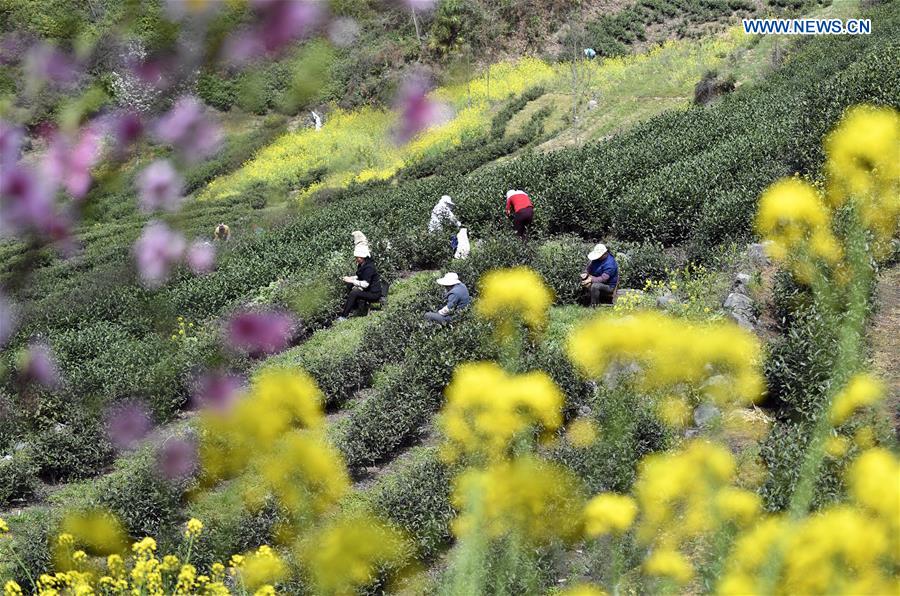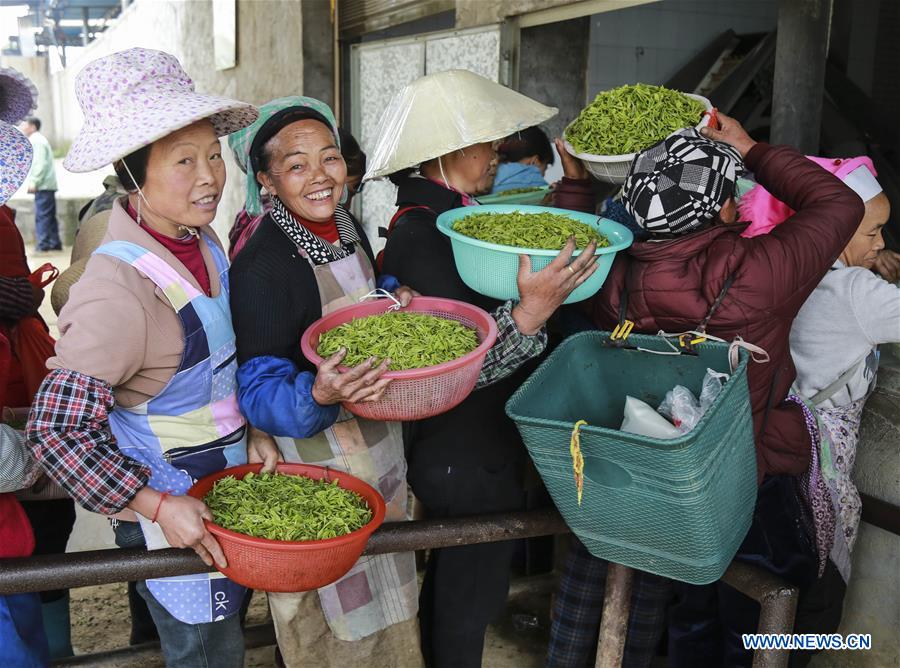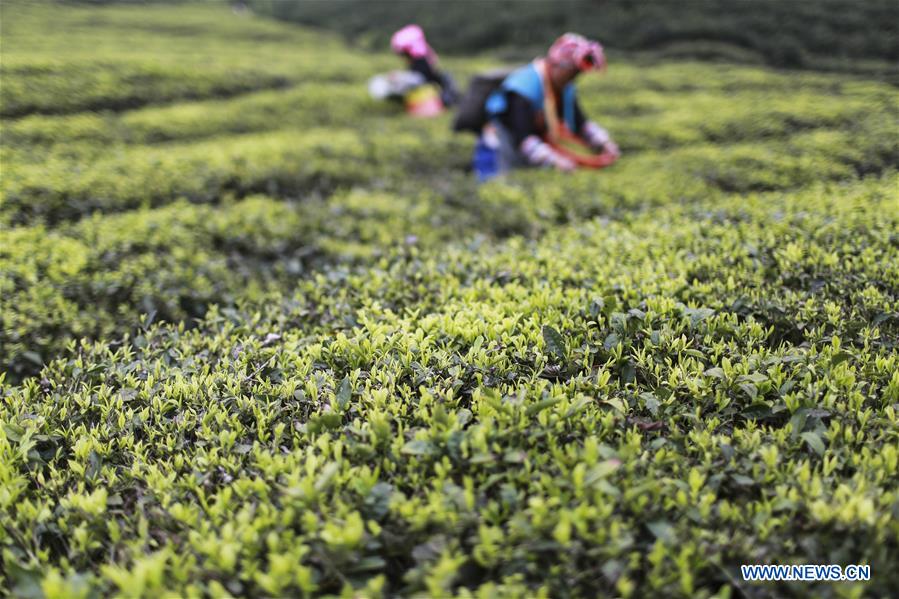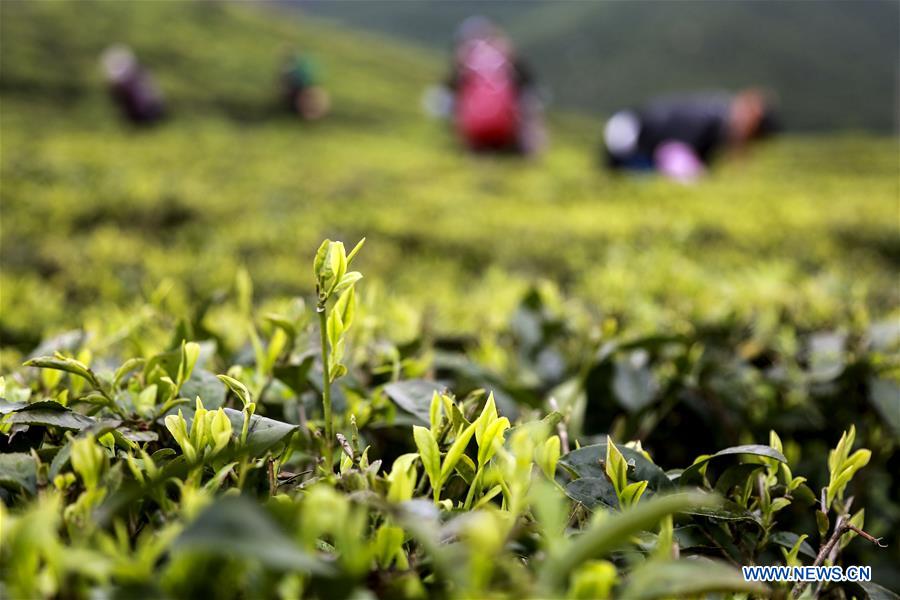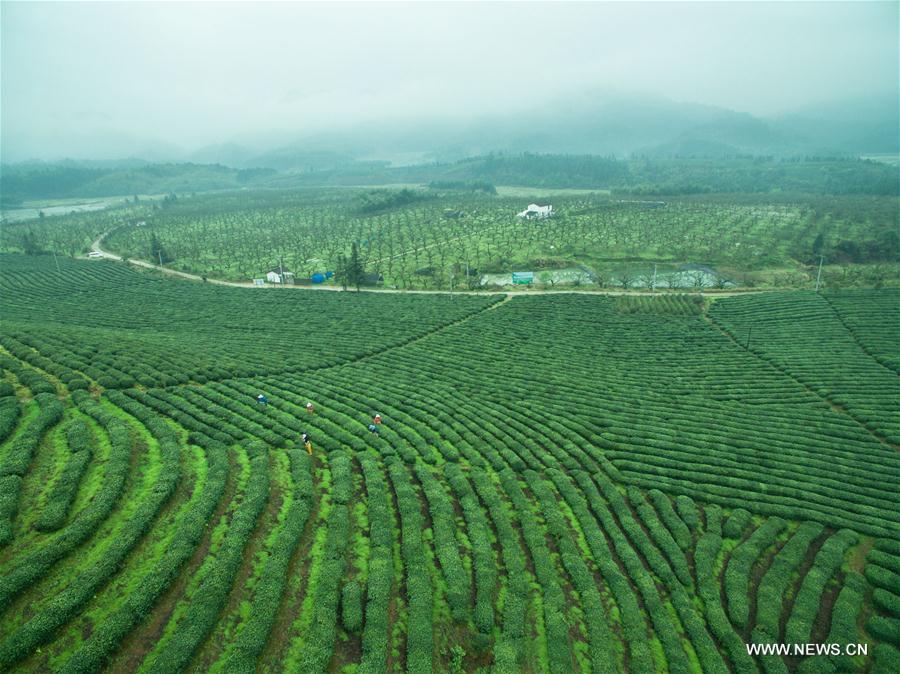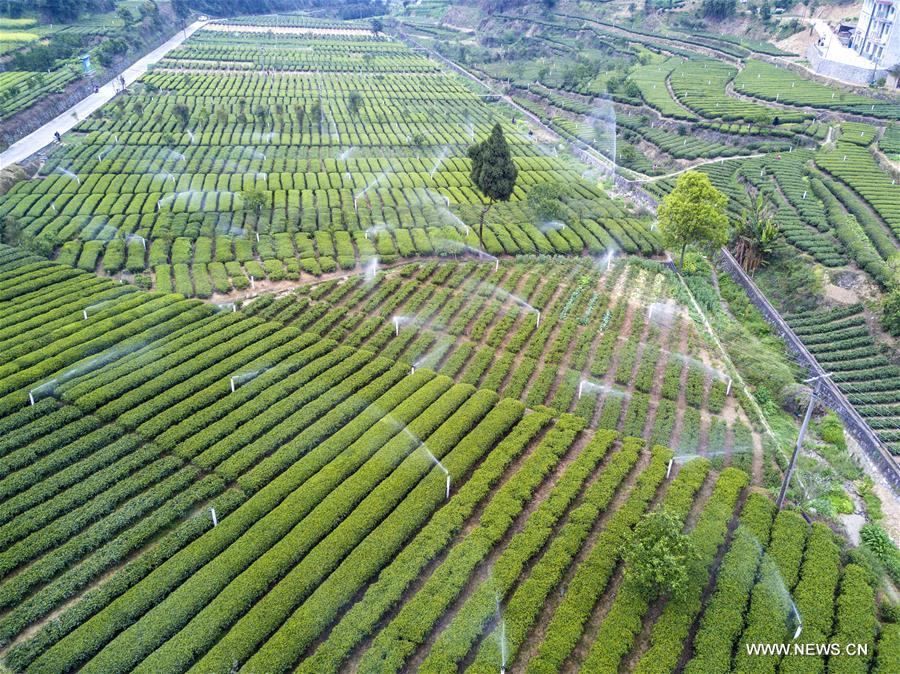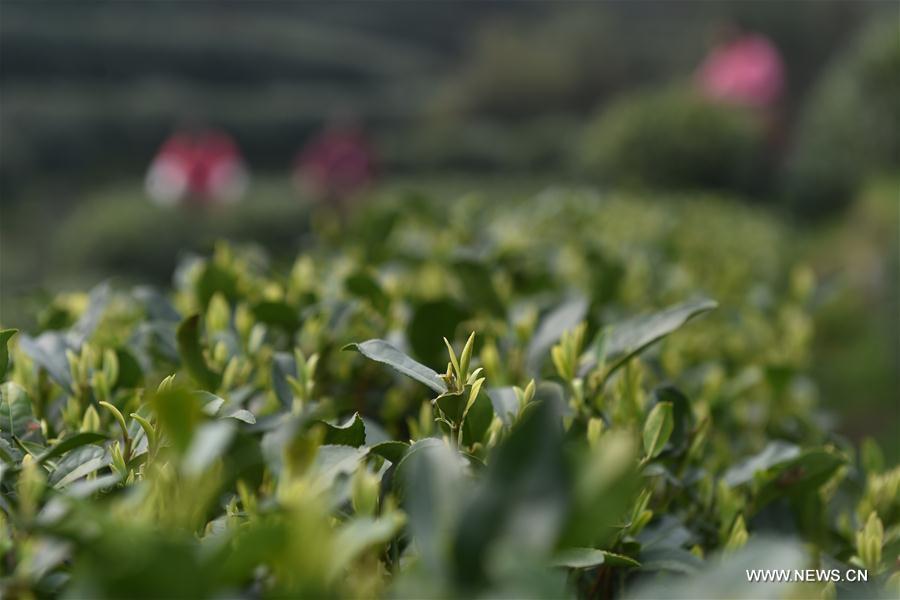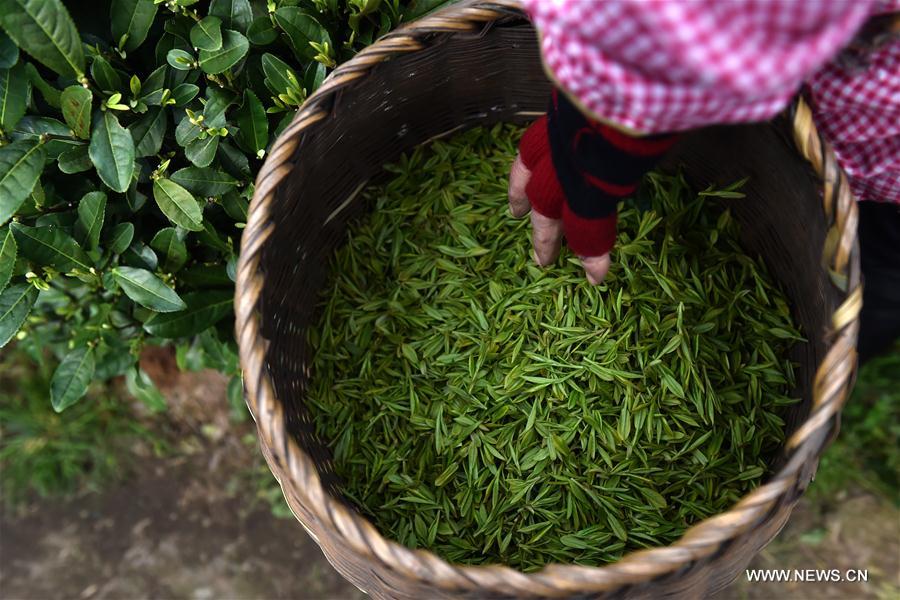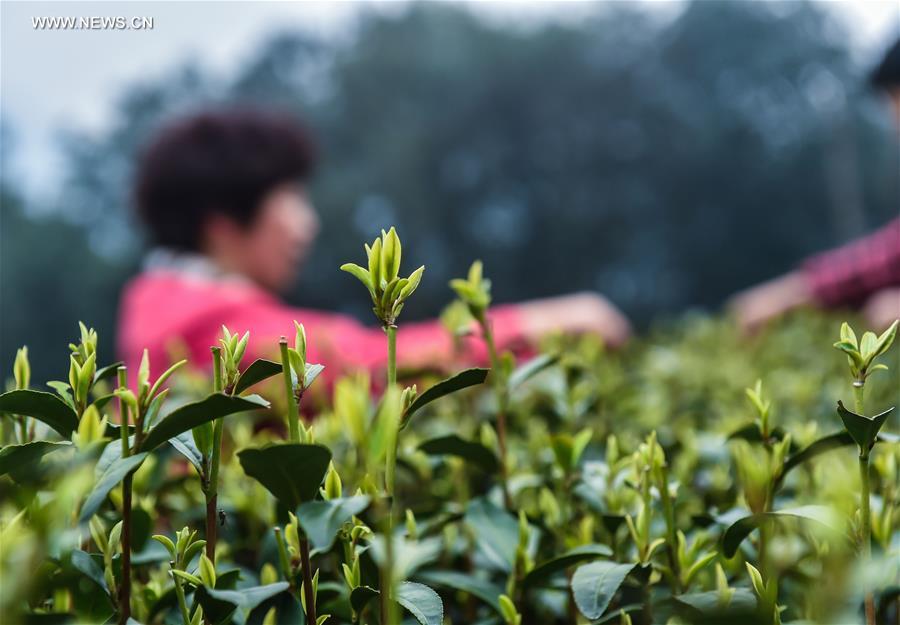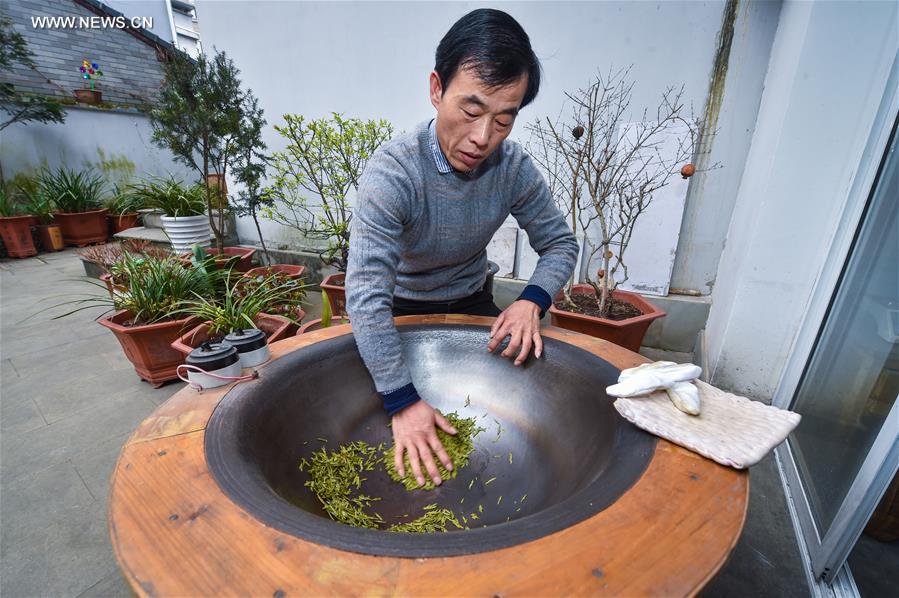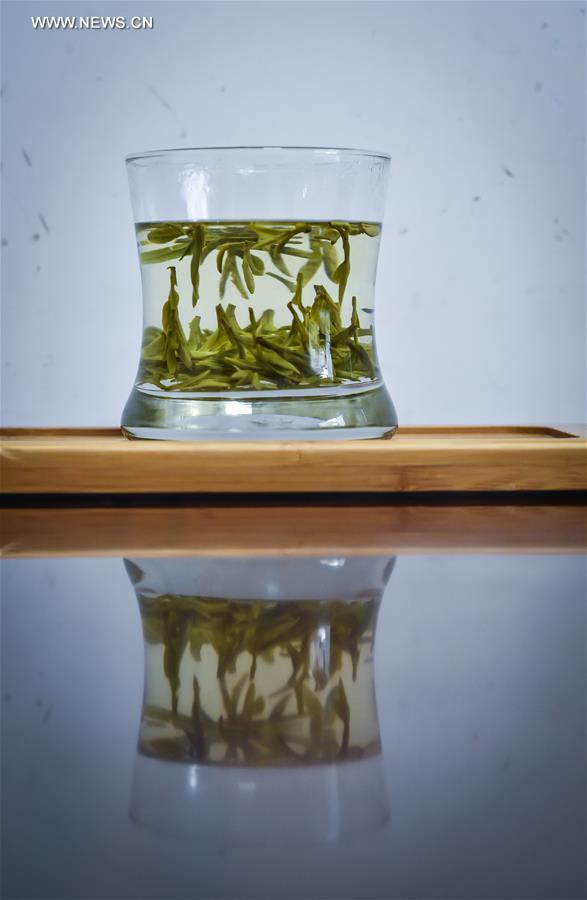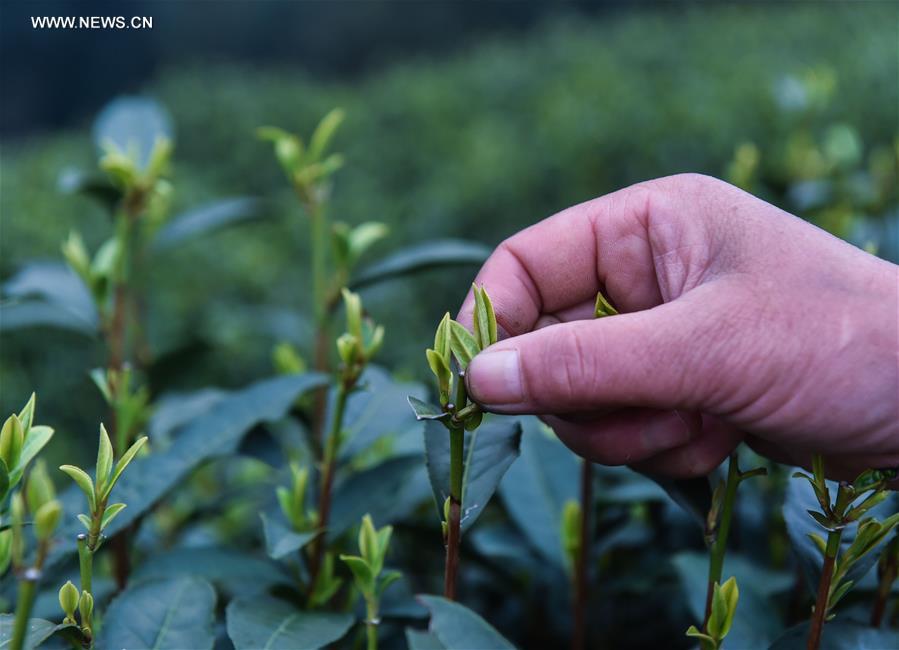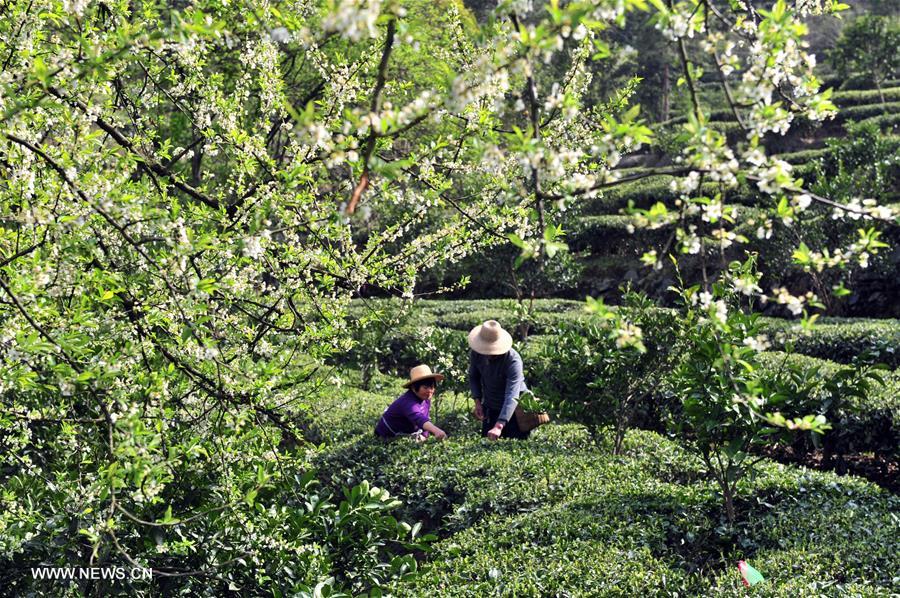Tourists visit an organic tea garden in Wujiatai Village of Xuan'en County, central China's Hubei Province, May 1, 2017. Chinese people are enjoying three-day International Labor Day holiday from April 29 to May 1. (Xinhua/Song Wen)
Tourists visit an organic tea garden in Wujiatai Village of Xuan'en County, central China's Hubei Province, May 1, 2017. Chinese people are enjoying three-day International Labor Day holiday from April 29 to May 1. (Xinhua/Song Wen)
Tourists walk on a cableway in Wujiatai Village of Xuan'en County, central China's Hubei Province, May 1, 2017. Chinese people are enjoying three-day International Labor Day holiday from April 29 to May 1. (Xinhua/Song Wen)
Farmers pick tea leaves on a mountain in Languan Township of Weng'an County, southwest China's Guizhou Province, April 30, 2017. (Xinhua/Ou Dongqu)
Farmers pick tea leaves on a mountain in Languan Township of Weng'an County, southwest China's Guizhou Province, April 30, 2017. (Xinhua/Ou Dongqu)
Aerial photo taken on April 22, 2017 shows tea gardens in Lichuan, Enshi, central China's Hubei Province. (Xinhua/Yang Shunpi)
Aerial photo taken on April 22, 2017 shows tea gardens in Lichuan, Enshi, central China's Hubei Province. (Xinhua/Yang Shunpi)
Combo photo shows tea buds before (L) and after pick-up at an organic tea garden in Longdong village at the foot of Emei mountain, southwest China's Sichuan Province, April 18, 2017. Longdong village, located at an altitude between 1,100 and 1,600 meters, has advantageous conditions to develop tea industry. Starting from 1990s, organic tea gardens have been developed among forests here. (Xinhua/Jiang Hongjing)
Tea farmer Xiong Jiachun, 80, picks up tea leaves at an organic tea garden in Longdong village at the foot of Emei mountain, southwest China's Sichuan Province, April 18, 2017. Longdong village, located at an altitude between 1,100 and 1,600 meters, has advantageous conditions to develop tea industry. Starting from 1990s, organic tea gardens have been developed among forests here. (Xinhua/Jiang Hongjing)
Combo photo shows the hands of a tea farmer in Longdong village at the foot of Emei mountain, southwest China's Sichuan Province, April 18, 2017. Longdong village, located at an altitude between 1,100 and 1,600 meters, has advantageous conditions to develop tea industry. Starting from 1990s, organic tea gardens have been developed among forests here. (Xinhua/Jiang Hongjing)
A tea farmer picks up tea leaves at an organic tea garden in Longdong village at the foot of Emei mountain, southwest China's Sichuan Province, April 18, 2017. Longdong village, located at an altitude between 1,100 and 1,600 meters, has advantageous conditions to develop tea industry. Starting from 1990s, organic tea gardens have been developed among forests here. (Xinhua/Jiang Hongjing)
Photo taken on April 18, 2017 shows tea trees covered by moss at an organic tea garden in Longdong village at the foot of Emei mountain, southwest China's Sichuan Province. Longdong village, located at an altitude between 1,100 and 1,600 meters, has advantageous conditions to develop tea industry. Starting from 1990s, organic tea gardens have been developed among forests here. (Xinhua/Jiang Hongjing)
Farmers pick tea leaves at a tea garden in Liyang City, east China's Jiangsu Province, April 15, 2017. (Xinhua/Yu Ping)
Farmers wait to hand in tea leaves at a tea garden in Liyang City, east China's Jiangsu Province, April 15, 2017. (Xinhua/Yu Ping)
A tea farmer shows the Jinjunmei tea in Wuyi Mountain, southeast China's Fujian Province, April 15, 2017. The Wuyi mountain has over 400-year history of black tea cultivation. (Xinhua/Zhang Guojun)
Jiang Yuanxun (L), a connoisseur on tea, tastes Jinjunmei tea in a natural reserve of the Wuyi Mountain, southeast China's Fujian Province, April 15, 2017. The Wuyi mountain has over 400-year history of black tea cultivation. (Xinhua/Zhang Guojun)
A tea farmer shows tea buds to make Jinjunmei tea in a natural reserve of the Wuyi Mountain, southeast China's Fujian Province, April 15, 2017. The Wuyi mountain has over 400-year history of black tea cultivation. (Xinhua/Zhang Guojun)
A tea farmer picks tea buds to make Jinjunmei tea in a natural reserve of the Wuyi Mountain, southeast China's Fujian Province, April 15, 2017. The Wuyi mountain has over 400-year history of black tea cultivation. (Xinhua/Zhang Guojun)
Farmers pick tea leaves at a tea garden in Shihegang Township of Xinyang City, central China's Henan Province, April 13, 2017. (Xinhua/Li Bo)
A farmer picks tea leaves at a tea garden in Shihegang Township of Xinyang City, central China's Henan Province, April 13, 2017. (Xinhua/Li Bo)
A farmer shows the newly-picked tea leaves at a tea garden in Shihegang Township of Xinyang City, central China's Henan Province, April 13, 2017. (Xinhua/Li Bo)
A farmer picks tea leaves at a tea plantation in Nanmu Village of Lichuan City, central China's Hubei Province, April 2, 2017. Harvest season for the spring tea has come in large parts of China. (Xinhua/Yang Shunpi)
Farmers pick tea leaves at a tea plantation in Heba Towm of Zunyi City, southwest China's Guizhou Province, April 2, 2017. Harvest season for the spring tea has come in large parts of China. (Xinhua/Luo Xinghan)
A couple pose for wedding photos at a tea plantation in Shaoshui Town of Quanzhou County, south China's Guangxi Zhuang Autonomous Region, April 2, 2017. Harvest season for the spring tea has come in large parts of China. (Xinhua/Wang Zichuang)
Tea buds are seen at a tea plantation in Nanmu Village of Lichuan City, central China's Hubei Province, April 2, 2017. Harvest season for the spring tea has come in large parts of China. (Xinhua/Yang Shunpi)
Farmers pick tea leaves at a tea plantation in Heba Towm of Zunyi City, southwest China's Guizhou Province, April 2, 2017. Harvest season for the spring tea has come in large parts of China. (Xinhua/Luo Xinghan)
A high-speed train runs past a tea plantation in Shaoshui Town of Quanzhou County, south China's Guangxi Zhuang Autonomous Region, April 2, 2017. Harvest season for the spring tea has come in large parts of China. (Xinhua/Wang Zichuang)
A farmer fries West Lake Longjing tea leaves to make them dehydrated in Meijiawu Village of Hangzhou, capital of east China's Zhejiang Province, April 1, 2017. West Lake Longjing is one of the most famous green tea brands produced near the city's West Lake. Farmers are busy in harvesting tea leaves ahead of the Qingming Festival, which falls on April 4 this year, to produce the Mingqian (literally "pre-Qingming") tea, which are made of the very first tea sprouts in spring and considered to be of high quality. (Xinhua/Xu Yu)
Farmers pick tea leaves at a tea garden in Haoping Village of Wenxian County in Longnan, northwest China's Gansu Province, March 31, 2017. Farmers are busy in harvesting tea leaves ahead of the Qingming Festival, which falls on April 4 this year, to produce the Mingqian (literally "pre-Qingming") tea, which are made of the very first tea sprouts in spring and considered to be of high quality. (Xinhua/Ran Chuangchang)
Farmers queue up to weigh the newly-picked tea leaves at a tea garden in Anshun City, southwest China's Guizhou Province, March 30, 2017. Farmers are busy in harvesting tea leaves ahead of the Qingming Festival, which falls on April 4 this year, to produce the Mingqian (literally "pre-Qingming") tea, which are made of the very first tea sprouts in spring and considered to be of high quality. (Xinhua/Lu Wei)
Farmers pick tea leaves at a tea garden in Anshun City, southwest China's Guizhou Province, March 30, 2017. Farmers are busy in harvesting tea leaves ahead of the Qingming Festival, which falls on April 4 this year, to produce the Mingqian (literally "pre-Qingming") tea, which are made of the very first tea sprouts in spring and considered to be of high quality. (Xinhua/Lu Wei)
Farmers pick tea leaves at a tea garden in Anshun City, southwest China's Guizhou Province, March 30, 2017. Farmers are busy in harvesting tea leaves ahead of the Qingming Festival, which falls on April 4 this year, to produce the Mingqian (literally "pre-Qingming") tea, which are made of the very first tea sprouts in spring and considered to be of high quality. (Xinhua/Lu Wei)
Farmers pick tea leaves in Guanmi Village of Lifang Township in Guangze County, southeast China's Fujian Province, March 30, 2017. Farmers here harvest tea leaves ahead of the Qingming Festival to produce the Mingqian (literally "pre-Qingming") tea, which are made of the very first tea sprouts in spring and considered to be of high quality. (Xinhua/Song Weiwei)
Aerial photo taken on March 29, 2017 shows the tea plantation at Luofo Village of Yichang City, central China's Hubei Province. (Xinhua/Du Huaju)
A farmer picks tea leaves at Luofo Village of Yichang City, central China's Hubei Province, March 29, 2017. (Xinhua/Du Huaju)
Farmers pick West Lake Longjing tea at a tea plantation in Hangzhou, capital of east China's Zhejiang Province, March 29, 2017. The West Lake Longjing tea has entered its picking season. Dubbed "queen of green tea", West Lake Longjing is produced in Hangzhou and represents one of the most famous teas in the country. (Xinhua/Huang Zongzhi)
A farmer stores West Lake Longjing tea at a tea plantation in Hangzhou, capital of east China's Zhejiang Province, March 29, 2017. The West Lake Longjing tea has entered its picking season. Dubbed "queen of green tea", West Lake Longjing is produced in Hangzhou and represents one of the most famous teas in the country. (Xinhua/Huang Zongzhi)
Photo taken on March 18, 2017 shows fresh West Lake Longjing tea leaves in a tea plantation in Meijiawu Village of Hangzhou, capital of east China's Zhejiang Province. West Lake Longjing Tea planters in Hangzhou are busy with their harvest work ahead of the Qingming Festival to produce the Mingqian (literally "pre-Qingming") tea, which are made of the very first tea sprouts in spring and considered to be of high quality. (Xinhua/Xu Yu)
Tea maker Zheng Wenyou dries fresh West Lake Longjing tea leaves at home in Hangzhou, capital of east China's Zhejiang Province, March 18, 2017. West Lake Longjing Tea planters in Hangzhou are busy with their harvest work ahead of the Qingming Festival to produce the Mingqian (literally "pre-Qingming") tea, which are made of the very first tea sprouts in spring and considered to be of high quality. (Xinhua/Xu Yu)
Photo taken on March 18, 2017 shows a cup of West Lake Longjing tea displayed in a tea plantation in Meijiawu Village of Hangzhou, capital of east China's Zhejiang Province, March 18, 2017. West Lake Longjing Tea planters in Hangzhou are busy with their harvest work ahead of the Qingming Festival to produce the Mingqian (literally "pre-Qingming") tea, which are made of the very first tea sprouts in spring and considered to be of high quality. (Xinhua/Xu Yu)
A farmer picks fresh West Lake Longjing tea leaves in a tea plantation in Meijiawu Village of Hangzhou, capital of east China's Zhejiang Province, March 18, 2017. West Lake Longjing Tea planters in Hangzhou are busy with their harvest work ahead of the Qingming Festival to produce the Mingqian (literally "pre-Qingming") tea, which are made of the very first tea sprouts in spring and considered to be of high quality. (Xinhua/Xu Yu)
Farmers pick tea leaves at Songshu'ao Village of Zigui County, central China's Hubei Province, March 26, 2017. (Xinhua/Wang Huifu)
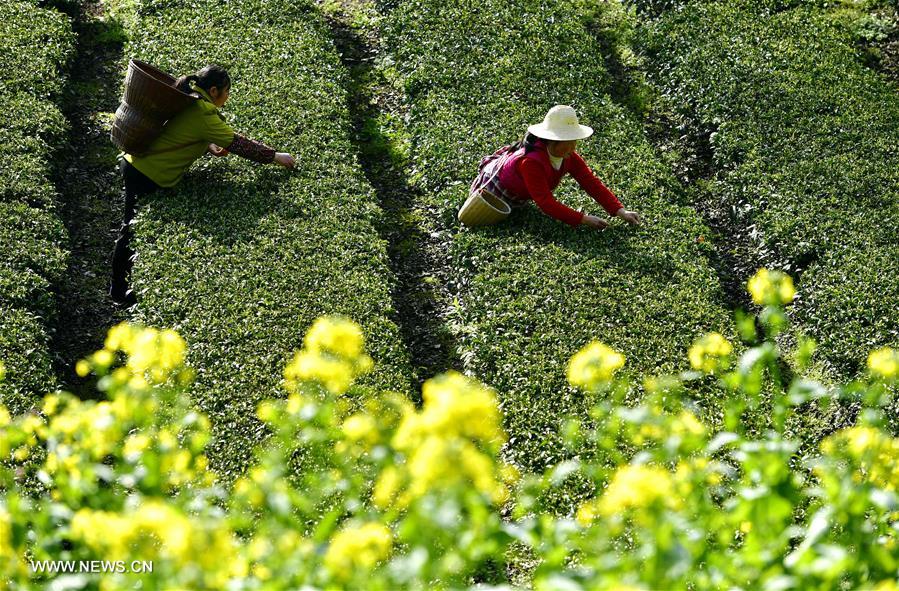
Farmers pick tea leaves at Erguanzhai Village of Enshi, central China's Hubei Province, March 26, 2017. (Xinhua/Song Wen)


















